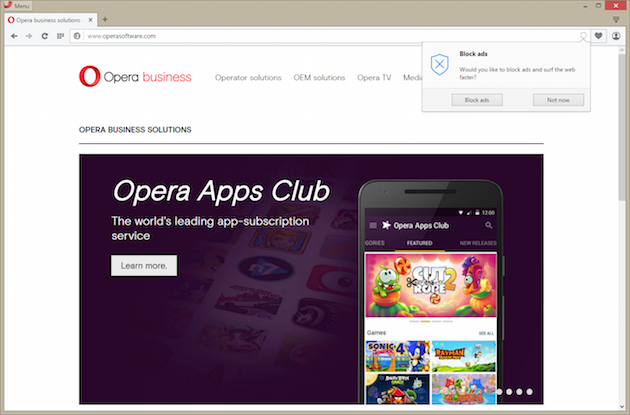
Microsoft Edge and Internet Explorer now trail Mozilla Firefox
Internet Explorer and Microsoft Edge are slowly but surely losing ground in the desktop space. In fact, according to web analytics company StatCounter, for the first time Mozilla Firefox has more usage share than the two other browsers combined. However, Google Chrome still reigns supreme
Google Chrome is now the most popular desktop browser according to all the major web analytics companies. NetMarketShare was the last one to crown it king earlier this month -- Google Chrome surpassed Internet Explorer in its rankings with a 41.71 percent usage share to the latter's 41.33 percent.

Mozilla asks the FBI for details of Tor vulnerability that could also affect Firefox
Mozilla is fighting to force the FBI to disclose details of a vulnerability in the Tor web browser. The company fears that the same vulnerability could affect Firefox, and wants to have a chance to patch it before details are made public.
The vulnerability was exploited by FBI agents to home in on a teacher who was accessing child pornography. Using a "network investigative technique", the FBI was able to identify the man from Vancouver, but Mozilla is concerned that it could also be used by bad actors.
Firefox 46 arrives, security and stability the order of the day for desktop users
Mozilla has released Firefox 46.0 FINAL, a relatively minor refresh of its desktop browser for Windows, Linux and Mac with no standout new features.
Also released is Firefox for Android 46.0, which does at least include some noteworthy new features such as the ability to display previously cached pages offline and support for sync via Firefox Accounts.

With security and privacy in mind, will more browsers follow Opera's lead and offer free VPN?
The modern internet user is somewhat paradoxical -- looking to be more connected and contactable than ever before, whilst simultaneously seeking privacy. Can the two ideas live side by side? It's a tricky balancing act, but many people turn to VPN tools to increase their security and privacy online.
Opera is the first web browser to bundle a free VPN tool as standard (with unlimited VPN data, no less), and it's hard to imagine that the competition won’t follow suit. Nothing has yet been announced, but the appearance of versions of Chrome or Firefox with integrated VPN would hardly be a surprise -- or would it? And how would you feel about a VPN tool supplied by Google?

Mozilla to make internet more inclusive
Years ago, personal computing and the internet was a hobby reserved for those with a lot of money. Unlike today where you can buy a Chromebook for under $200, a desktop could cost $3,000 or more -- preventing many from participating. In other words, even in many of the richest countries in the world, many people could not afford to surf the web.
Nowadays, however, the number of people owning internet-connected devices has exploded. Heck, many households have multiple such devices and Wi-Fi is ubiquitous. Sadly, not everyone in the world has internet access, and many folks are computer illiterate -- including oppressed women in some countries. Thankfully, Mozilla is looking to change this by making the internet more inclusive.

Mozilla brings better security to Firefox for iOS
Security has been in the news since Edward Snowden; before actually, just not as prominently. Now, in recent weeks, the headlines have focused on Apple over its iPhone dispute with the FBI, a saga that seems to have come to an end recently.
That is not, however, the only security that needs to be part of our daily lives. Web browsers represent yet another problem and most are working to add layers of protection for customers.

Opera's desktop browser adds a built-in ad-blocker
A growing number of major players in the tech industry are now in support for blocking ads. Apple offers this kind of feature in Safari on iOS, ASUS bundles AdBlock Plus on its mobile devices, while Three, a major UK carrier, blocks ads at the network level. And, as of today, Opera Software is also a member of this group.
Opera Software just announced that its desktop browser -- which is available on Windows, OS X and Linux -- will come with a built-in ad-blocker, which is a first for a major browser. The feature can be tested now in the Developer channel version of Opera and, once it is deemed ready for prime time, it will make its way to the public version of the browser.
Firefox 45 unveils improved Synced Tab features, but removes Tab Groups
Mozilla has unveiled Firefox 45 FINAL, its desktop browser for Mac, Linux and Windows. The new release focuses its changes on the browser’s use of tabs, and also becomes the base for the new Extended Support Release.
New features include instant tab sharing in Hello and a new Synced Tabs button, but one feature has been removed: Tab Groups.

Ghostery 6.0 for Firefox redesigns UI, syncs settings with other devices
Anti-tracking company Ghostery has updated its Firefox add-on to version 6.0 in what the developer is calling "the most significant upgrade to Ghostery since its inception".
The interface has been redesigned, with a new dashboard giving an immediate view of the trackers on a site, revamped menus and alerts, and assorted beginner-friendly usability tweaks ("Whitelist Site" is now "Trust Site").

Copy Plain Text strips the formatting from copied text (Firefox)
You’re browsing the web, find some interesting text, copy and paste it elsewhere… And then realize it’s got all the original formatting, now entirely unnecessary. And maybe an unwanted image, too.
Copy Plain Text is a Firefox add-on which supports copying plain text only, and adds some handy text processing extras as well.

Firefox OS is leaving handsets but moving on to IoT
Have we heard enough about the Internet of Things yet, or is it only just the tip of the iceberg? There are more players in this game all the time, and the latest is Mozilla. Yes, the folks who produce the Firefox web browser, among other things.
The move isn't entirely new, the organization alluded to moving its operating system here already. To date Mozilla has been testing products to bring into the fold, and it is moving forward with its plans.

Mozilla kills Firefox OS 2.6 for smartphones but it lives on in smart TVs and connected devices
Following on from the announcement that Firefox OS would no longer be developed for smartphones, Mozilla has explained the thinking behind the decision (failures on its part) and also revealed that Firefox OS will continue to live on in other devices.
The operating system is already used to power Panasonic SmartTVs, and this is set to continue. This will certainly come as good news to owners of such TVs, but Mozilla says that the OS stack will be used in a range of Connected Devices.

Mozilla moves Firefox to variable release schedule
In mid-July 2011, Mozilla announced that it would speed up the release schedule for Firefox, bringing it down to just six weeks between major versions. Firefox 5 and subsequent releases have been impacted by this decision, bringing new features and changes to users at a faster pace. Fast forward to today, and the organization decides to relax things a bit.
After studying the fixed -- so-called "Train Model" -- release schedule process "carefully" and learning "a lot" from it in the past years, Mozilla has announced that Firefox is now moving to a variable release schedule.
Firefox 44 adds H.264 video support on desktop, supports cloud printing on Android
Mozilla has released Firefox 44 FINAL for Windows, Mac and Linux, with Firefox 44 for Android hot on its heels. Like the previous release, the most visible changes are reserved for the mobile build.
Android users gain support for cloud printing and improved search tools, while desktop users can now watch H.264 video on supported systems. Most other changes are under the hood or aimed at developers.

Security vulnerabilities, exploits are on the rise
It’s been a busy year for security firms everywhere -- cyber-attacks, malware, ransomware and other malicious online behavior reached new heights in 2015.
Those are the results of a report by Bromium, a company which deals in threat isolation in service of data breach prevention. Its report, entitled Endpoint Exploitation Trends 2015 analyzed the security risks of popular websites and software.
